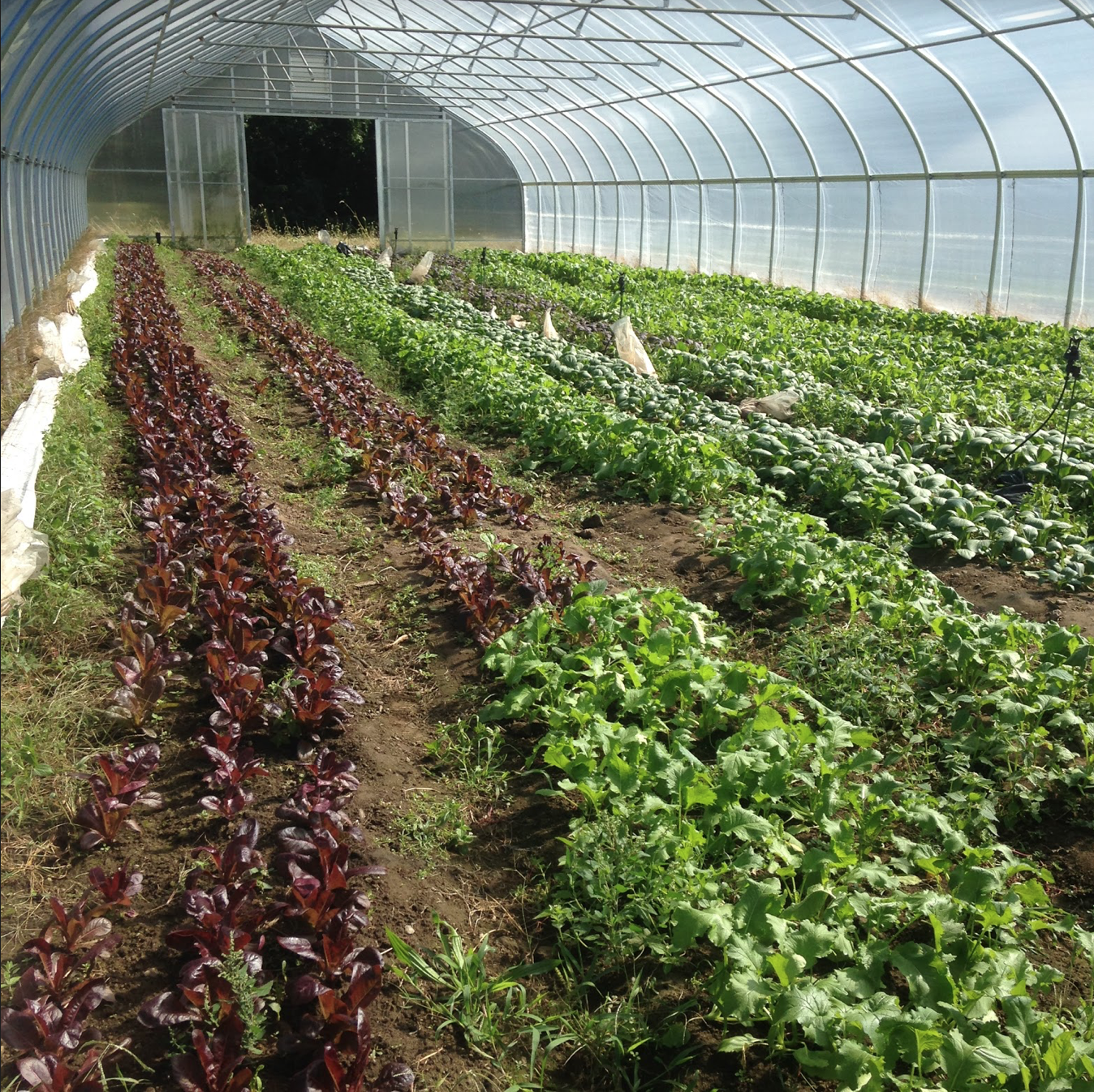Life in the “dead” of winter – High Tunnels alive and well in CT

January 22, 2020
An update from NOFA’s technical consultant and “embedded” reporter, Monique Bosch
 During this ‘dormant’ time of year, it’s refreshing to see cold season crops flourishing in high tunnels across the state. Some of the healthiest food we’ve seen this winter have been in high tunnels that are practicing ‘no-till.’ Let’s take a tour together above, and below ground, to see what’s living.
During this ‘dormant’ time of year, it’s refreshing to see cold season crops flourishing in high tunnels across the state. Some of the healthiest food we’ve seen this winter have been in high tunnels that are practicing ‘no-till.’ Let’s take a tour together above, and below ground, to see what’s living.
First stop; The Hickories in Ridgefield CT.
Farm manager Jaci Slattery gives us a look inside her high tunnel, where delicious chard, spinach, and romaine are growing well.
This high tunnel has been no-till since it was built, about 5 years ago. Broad-fork and surface rake have been the only tools used. Keeping plants growing year-round ensures the biology thrives. The space goes through several iterations through the year; propagation house in spring, followed by salad mix, summer tomatoes then winter crops. This particular high tunnel is on a slope. Jaci has found that keeping roots of plants such as tomatoes in the ground to decay helps stop erosion during heavy rains. This past year Jaci added two new inputs; beneficial nematodes, to help with flea beetles, and compost tea. We found one of the nematodes when viewing a soil sample under the microscope:

Jaci spoke about some of the challenges of no-till: “Weed control is the biggest challenge. We manage it with frequent surface tillage and some hand-weeding. This coming Spring, when tables are above the beds holding seedling trays, we are considering a cover crop below. We think buckwheat might be a good choice, with little regrowth and excellent residue after cutting to act as mulch.”
 Next stop; Massaro Community Farm in Woodbridge CT.
Next stop; Massaro Community Farm in Woodbridge CT.
Farm Manager Steve Munno and Executive Director Caty Poole gave us a tour of their high tunnels, producing delicious winter crops with no-till methods.
We took a soil sample from the high tunnel growing a cover crop of peas/vetch/oats. It had been mowed the day before. The plan is to open the high tunnel doors as outdoor temperatures drop, resulting in a ‘winter kill’ that will speed up decomposition. The ground should be ready for sowing in early March.
Like butter, the soil lifted without a fuss, releasing a luxurious forest smell
Under the microscope the sample proved to be just as rich, with aggregates full of bacteria, a nice balance of fungi and plenty of flagellates consuming the bacteria:
Growing food year-round in the high tunnel is an optimal environment for no-till. Under these controlled conditions leaving the soil undisturbed has several advantages:
- promotes a healthy soil food web
- fewer pests, due to the healthy micro-ecosystem in and above the soil
- reduces weed populations:
- bacteria/fungi balance is maintained
- less exposure of dormant seeds
Andrew Mefferd has traveled around the world to connect with farmers and researchers about no-till farming and soil conservation. In his book he talks about growing no-till in high tunnels: “We can grow nutrient-dense foods, reduce and eliminate inputs and consequent negative outputs, and pull carbon out of the atmosphere while reinvigorating the hydrological cycle that has been so disrupted by thousands of years of over tilling, overgrazing, deforestation, and soil compaction.”
For many farmers ‘no-till’ sounds like a daunting experiment. John Kempf, founder of Advancing Eco Agriculture (https://www.advancingecoag.com/john), doesn’t think it has to be an ‘all or nothing’ approach: “We need to change the conversation. Instead of ’tillage’, we might consider ‘soil particle management’. Finding ways to nurture the soil and the microbes who inhabit it will produce resilient plants, healthier food and as a result, benefit us all.

Recent Posts
Support the CT Environmental Rights Amendment Public Hearing
This is the time to make your voice heard at the CT General Assembly in support of the CT Environmental Rights Amendment! The public hearing is when the legislators are most likely to be listening to and reading what you have to say, and then what you say goes into the public record!
Read MoreBulk Order NOFA Membership Discounts
The Bulk Order, in its previous format, is no longer taking place. The legacy of the Bulk Order continues – not as a one-time order event, but as an ongoing member benefit that supports growers, and grows over time as we add more vendors and wholesale-level access.
For 2026, we are connecting members to quality organic growing supplies with a direct-to-consumer purchasing option through our program partners: Progressive Grower and Fedco Seeds.
Read More

